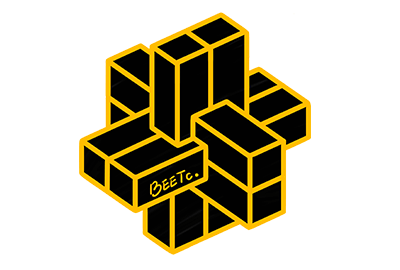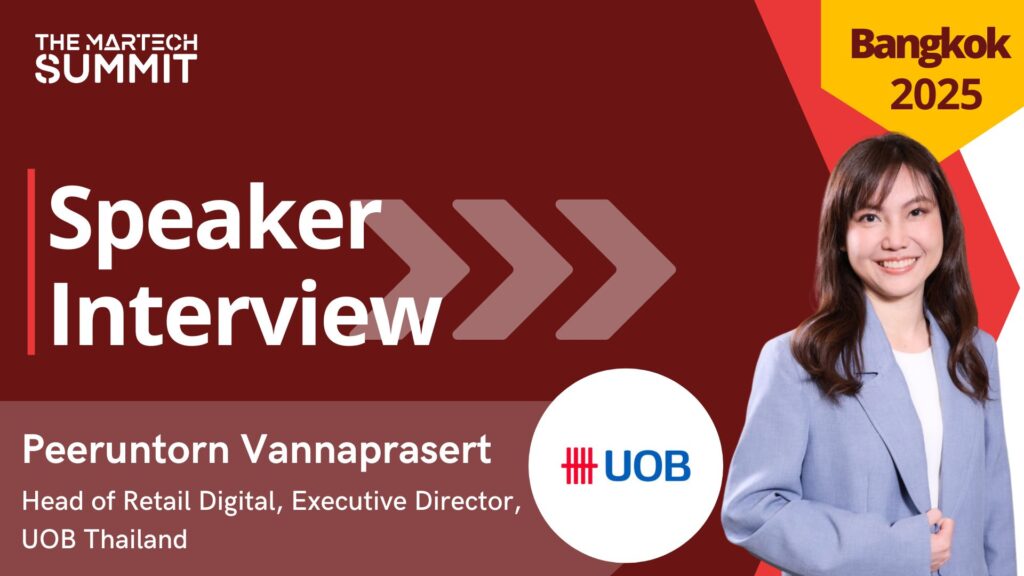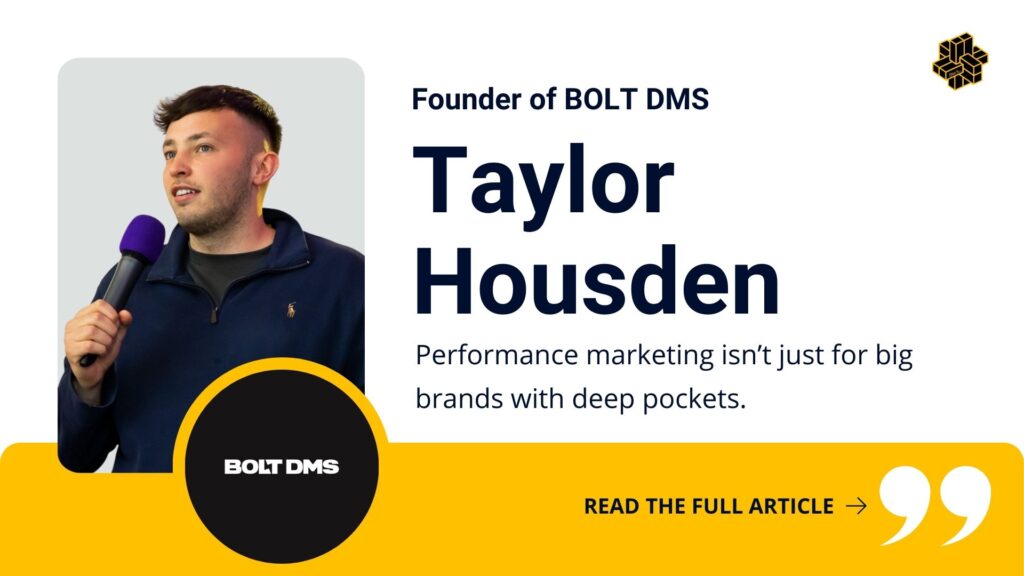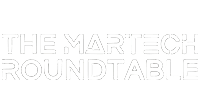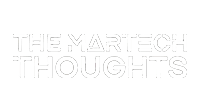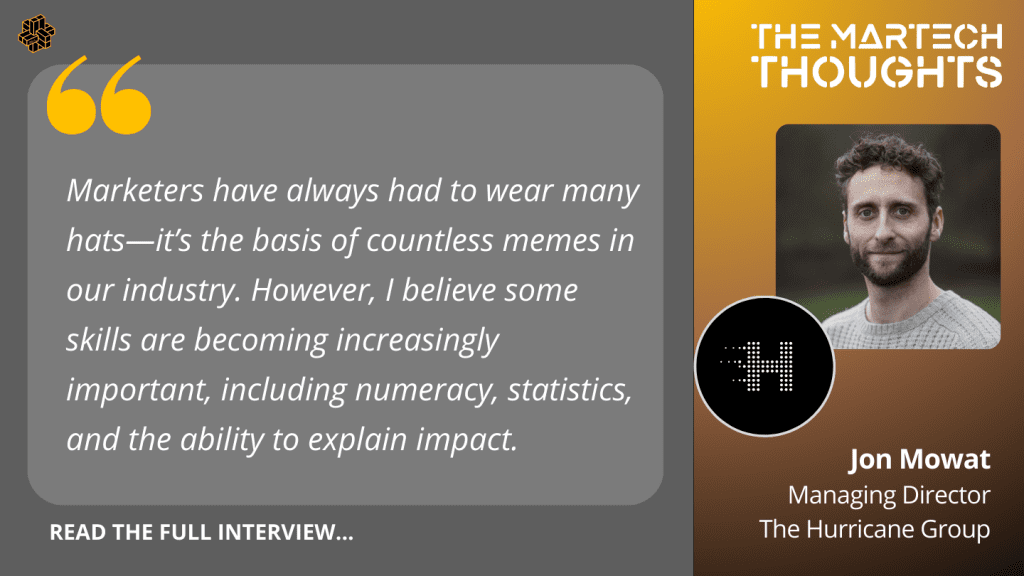
Welcome Jon Mowat, Managing Director of The Hurricane Group, to the MarTech Thoughts series. Jon Mowat shares insights on video marketing, brand storytelling, and the evolving skillsets in marketing. Read the full interview for some powerful insights into driving brand growth!
How do you describe your job to a 5-year-old?
We help sell things to people who don’t really need the things by making them feel that they can’t live without the things that people sell.
What is the one marketing platform/app/solution you can’t live without? Why?
A solid video marketing platform revolutionises video across the entire sales funnel. Stop hosting on YouTube! Twenty Three is my go to favourite. It gives you Video hosting, user tracking, webinars, great analytics, content gating and live connection with your CMS. It’s a game changer.
Currently, what are you primarily looking for in your digital marketing efforts? Awareness, engagement, conversion, or retention? Why?
Across our work with clients, we’re consistently working to increase growth across all stages in the sales funnel. It’s easy for brands to focus on the top of the funnel or the very bottom. But really, a good strategy must keep an eye on all stages, even if sales are calling for immediate conversions or the CEO wants to “be on TV”.
At present, throughout the Hurricane Group itself, we are in a great position with our technical SEO, so our team has moved their efforts to creating a wide ranging and engaging thought leadership campaign. For us as a B2B brand, it’s important to leverage my profile as a speaker and author – to break through the noise and create distinctive, unforgettable content.
What are some of the significant changes to your customer outreach and retention strategies? And how has it impacted the growth plan for upcoming years?
Over the last years we have increasingly moved towards in person events alongside our digital marketing. It works best when both of them are in step. If I speak at a conference, not only do I get new leads and connections, but I develop new content for the calendar, and we have plenty to talk about on social. This strategy has delivered many clients, but more importantly, it has built strong relationships with great clients.
How do you see the skillsets needed for the marketing profession changing?
Marketers have always had to wear many hats—it’s the basis of countless memes in our industry. However, I believe some skills are becoming increasingly important, including numeracy, statistics, and the ability to explain impact.
I know this might sound boring and not what many associate with marketing. But as the industry increasingly aligns with the “marketing effectiveness” movement—driven by organisations like the Ehrenberg-Bass Institute and the IPA—we’re more frequently required to prove success.
The reason I support this approach may not be what you expect. I’m not saying we should focus solely on what’s measurable at the bottom line, because there’s already too much of that. Direct response agencies have been dominating the conversation for too long, and real brand-building has suffered because of it. No, we need a full-funnel approach, but we also need data to back it up. To demonstrate the long-term benefits of brand building and show how emotions drive behaviour change, we need to understand how data works.
Convincing a CFO to increase media spend is easy when ROAS is at 30, but how do you persuade the same person to allocate a significant budget to an emotional campaign with no immediate, traceable revenue? We all need to become more comfortable with attributing data points and talking numbers.
How do you keep your team motivated to get the best out of them during challenging economic times with additional external pressure?
We love an internal company culture session – complete with wacky challenges, including building spaghetti towers (transportation to the final presentation place is required, of course), a crumpegg, don’t knock it until you try it – and always plenty of laughter.
Please share with us one of the best campaigns you have seen recently or your all-time favourite campaign, and tell us why.
Ok, so first things first—yes, I’m name-checking one of our own campaigns. Not because we’re awesome (cough), but to highlight what happens when a brand embraces telling complex stories to its audience.
There’s a growing trend towards shorter social content, but when you’re a global healthcare provider like Bupa, sometimes short just won’t cut it. Explaining the links between climate change and healthcare isn’t something you can do in a series of 10-second TikToks! In the Healthy Planet, Healthy People series, Bupa trusted us to create four long-form documentaries on these important topics. We told deeply human stories while tying them to the brand message. Even though the films ranged from 6 to 11 minutes, we saw off-the-charts engagement—far exceeding what the “shorter is better” mindset would have predicted.
Longer storytelling also has an unexpected advantage: your audience is exposed to your brand for a much longer period. Would you rather reach 60% of a large audience for 5 minutes or 95% of them for 20 seconds? We developed the Cost Per Viewing Second (CPvS) metric to demonstrate the value of this approach.
What will be the next evolution in marketing technology that we can expect in the coming years?
I expect the next phase to see more integration between personalised content and a company’s CMS. Personalised platforms like Idomoo and video marketing platforms like Vimeo and Twenty Three are already starting to link views to individuals in a more granular way than ever.
From there, we can expect to see auto-triggering sequences of content personalised to a viewer stage in the buying process. In this, we will see AI-generated content being sent to viewers. However there is a long way to go with ethics and brand safety until I will recommend that final stage to our clients.
How could a marketer start utilising the Metaverse?
Honestly, as someone who’s been in this field for 25 years, my first pieces of advice are to ask yourself, “Why am I doing this?” and “Can I get the same results more easily elsewhere?” The Metaverse is cool, shiny, and exciting—which can be the downfall of an efficient marketing department that loves nothing more than diving into the latest shiny thing! The Metaverse has some really successful case studies, but it’s not a silver bullet.
If you have a specific audience to reach in the Metaverse and understand the landscape in detail, great, go for it. But for most brands, it can be a total waste of effort. If that’s not enough to put you off and you still want to proceed, spend a lot of time exploring the Metaverse in all its forms—from Roblox to virtual worlds. If you still see an opportunity, be wary of snake oil sellers promising the moon.
Before starting any project, get a very clear focus on what you’re trying to achieve and your real “why.” Brand-building metrics like viewers and time spent in the game or world are easy to gather, but if your company wants to know, “How much did we make?” you’ll face a much harder challenge.
With the advancement of AR & VR, how do you see these being utilised in Digital Storytelling?
As a digital storyteller, I consistently get excited about AR and VR opportunities. Non linear storytelling and self exploration are really interesting. We have done multiple projects in both of these areas. But I have to say it is all ultimately slightly disappointing.
There are two reasons for this. Firstly, Post-Covid, people simply don’t want to put on headsets or to hold devices, so traditional places where we would use these systems (i.e. live events) are pretty much cut off. There are still opportunities, but an interactive video that can be controlled with a contactless remote is more appealing than a headset. Secondly, there is a reason that we tell stories in a linear fashion. It means we can reveal what’s important for maximum effect.
Once viewers have choices, it tends to make stories less powerful, not more. For that reason we tend to use it for self discovery of “facts” rather than for emotional brand storytelling.
Any fun facts about yourself that you want to share?
I have Saddam Husein’s towel rail in my kitchen.
A big thank you to Jon Mowat, Managing Director at The Hurricane Group, shares his thoughts on video marketing, brand storytelling, and the evolving skillsets in marketing. If you want to connect with Jon, feel free to reach out via LinkedIn!
See more MarTech Thoughts interview pieces here!
Last updated: October 2024
